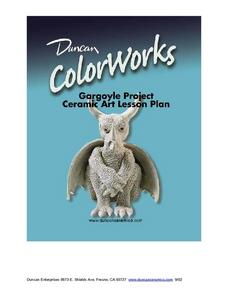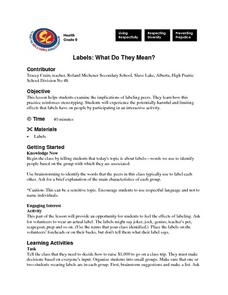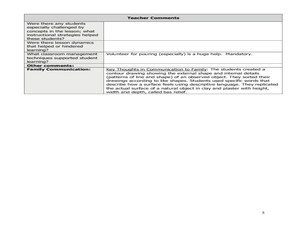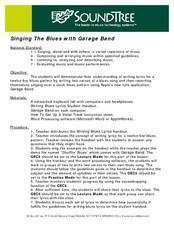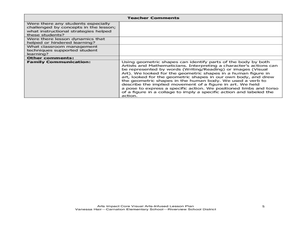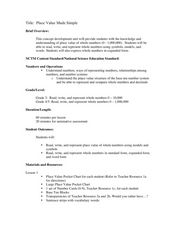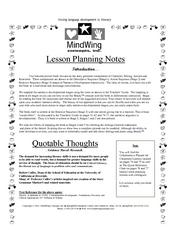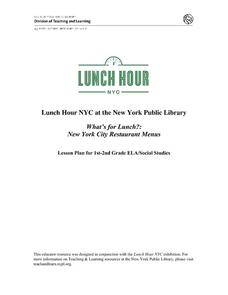Curated OER
Red Riding Hood in China
Inspire young writers to compose their own version of the fairy tale "Little Red Riding Hood." They begin by reading "Little Red Riding Hood" and the Chinese version <i>Lon Po Po</i>, then they compare and contrast the two...
Curated OER
All About Our Town
Pupils explore brochure writing. They work in groups to brainstorm and categorize important places in their community. In addition, they gather information from the Internet, take pictures using a digital camera, and create a community...
Curated OER
Exaggerated Poetry
Students use physical poses and vocal choices to create emphasis in communication. In this exaggerated Poetry lesson, students use physical movement and vocal choices to exaggerate an expression make a connection between literary content...
Curated OER
Dance: Sharp and Smooth Energy Qualities
Students use different qualities of movement to express themselves. In this lesson on movement, students use different qualities of energy and then use their experience as an inspiration for writing poetry.
Curated OER
Cloze Instruction
Bring Goldilocks and the Three Bears, Mad Libs, and cloze activities to your college class with this lesson. They complete a cloze instruction activity in which the students choose words that would fill in the blanks and create their own...
Curated OER
Gargoyles: Ceramics
Study the symbolism and significance of Gargoyles throughout the Gothic era, and then make one. Kids visit three different websites to learn about these goolish protectors, then hone their sculpting skills while making one. They make...
Curated OER
Labels: What Do They Mean?
Ninth graders brainstorm words they typically use to label each other, discuss effects of labeling, including reinforcement of stereotypes, and experience potentially harming and limiting effects that labels have by participating in...
Curated OER
Parts of a Plant
First graders discover the parts of a plant. For this science lesson, 1st graders identify and label the parts of a plant and record their findings on a word processor.
Curated OER
Plaster Casts of Natural Objects
Fourth graders observe objects in science and create a contour picture of the the object. In this arts and science observation instructional activity, 4th graders develop a clay sculpture of their object. Students generate a list of...
Curated OER
Take a Walk in Their Shoes: Great Leaders of Our Time
Research the characteristics of leaders who have used nonviolence to change society. The class then applies this information to their own community to find leaders with these same characteristics, creating a wall collage of pictures and...
Curated OER
Idioms
Use this podcast lesson plan to familiarize scholars with the characteristics, history, and cultural implications of idioms. As part of the Walking Classroom curriculum, kids listen to a 12-minute podcast as they walk around campus. If...
Curated OER
Singing the Blues with Garageband
Music composition can be easy with a little software assistance. The class uses Garageband to listen to, write, sing, and record a blues song. They listen to the song provided through the software, write their own lyrics to the song,...
Curated OER
American History Through the Len of the Supreme Court Decisions
Students examine the historical background of Supreme Court decisions and the basic principles behind legislation. As part of the lesson, students discover legal concepts and terms and write sentences using the vocabulary they have...
Curated OER
Dance Integration With Social Studies
Have your class learn through movement. Learners study patriotic symbols through dance. They listen to spoken words and portray the story. They practice using space, and arm and leg movements to tell the story. What a creative way to...
Curated OER
Measurement and Conversion of Units in a Recipe
In a cross-curricular measurement and literacy lesson, your class will identify and compare cooking measurement instruments. They read a recipe and sequence a set of similar instructions in which the steps have been mixed up....
Curated OER
Bodies In Motion: Shapes and Gestures
Students use geometric shapes to describe body parts. In this geometry lesson, students use geometry vocabulary as they discuss body parts. They practice drawing bodies using shapes based on a wooden model that is poised to show specific...
Curated OER
Congruent Polygons: Copying Stretchy Shapes
Third graders investigate congruent polygons through dance. In this congruency instructional activity, 3rd graders do the "brain dance" as a warm up. They review polygon names by singing "The Polygon Chant," before mirroring congruent...
Curated OER
Applying Ahimsa to Traditional Stories
Investigate the life of Mahatma Gandhi by researching non-violent lifestyles. Learners define the word ahimsa and discuss the personal characteristics that made Gandhi a peaceful warrior. They also create a poster about the story "The...
Curated OER
Place Value Made Simple
Elementary schoolers explore place value to the millions place. They construct and evaluate the value of numbers. Working in small groups, pupils problem solve with pocket place value charts, and examine standard and expanded forms. This...
Curated OER
Roman Bernardo: Solving Linear Equations
Mathematicians use an inquiry method to solve linear equations. In this linear equations lesson, young scholars practice solving equations using addition, subtraction, multiplication and division. They solve multi-step equations and...
Curated OER
Reproduction, Day 1: Reproductive System
Engage Secondary Special Education students in a developmentally appropriate lesson on human reproduction. They review genital anatomy and 5 key components that comprise the reproductive cycle. Perfect for a mild to moderately disabled...
Curated OER
The Things That Bothered Farmer Brown
Link language development to literacy skills. This lesson template provides a comprehensible way to use the Braidy Web to maximize language and reading skills. It would be appropriate for developmentally disabled pupils reading at a K-2...
New York Public Library
What's for Lunch?: New York City Restaurant Menus
Do you remember the days when a cup of coffee cost five cents? At A.W. Dennett restaurant in 1894, you could buy a five-cent cup of coffee and as well as a five-cent slice of pie to accompany it. The menu from that year is a primary...
Stanford University
Prohibition
Prohibition banned the selling of alcohol in America—but why? Designed for high school pupils, the lesson explores the causes of Prohibition including the Temperance Movement. The lesson pairs a PowerPoint presentation with worksheets...







